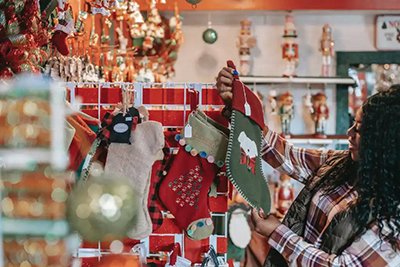
By Stacy M. Brown
An overwhelming majority of Black consumers have experienced some fraud and, contrary to common belief, younger adults generally experience fraud more often than their older peers.
In a new survey revealing various holiday shopping scams, AARP warned of a spike in fraud attempts that continue to occur during the holidays.
The report was released Tuesday and followed an in-depth roundtable co-hosted by AARP and the National Newspaper Publishers Association (NNPA).
The survey revealed that fraud and scams take many forms, including online ads and travel bookings, peer-to-peer payment platforms, stolen gift cards, fake charities, fake shipping issues, and theft of porch packages.
Researchers discovered that 64% of U.S. consumers strongly agree that lawmakers need to do more to protect consumers.
Three out of four U.S. adults aged 18-plus have been targeted by or experienced at least one form of fraud.
Monetary donation requests from fake charities top the list, followed by fraud when buying a product through an online ad and receiving fake notifications about shipping issues.
Half of the consumers aged 18-34 say they have purchased a product or service through clicking an advertisement they saw on social media in the past 12 months. Over one-third of this age group have experienced fraud when seeking to buy a product through an online ad.
Further, AARP researchers found that two-thirds (64%) of shoppers surveyed correctly identified the following statement as true: “The safest way to make purchases online is with a credit card.”
Officials said while intentions for making purchases this holiday season with a credit card are up this year compared to last year, many still plan to use their debit card. Plans to shop with a debit card are even higher among Black and Hispanic shoppers.
“While credit and debit cards offer essentially the same protections, fraud with your debit card involves money leaving your bank account,” said Kathy Stokes, AARP’s Director of Fraud Prevention, Fraud Watch Network.
“While the bank investigates, you have no access to the lost funds to pay your bills.”
The AARP report found that intended off-the-rack gift card purchases pose a severe threat. Whether at a pharmacy, grocery store, or website, scammers are poised to pounce.
The fraudsters mainly target gift cards that sit on store racks.
“They record the gift card number, expose and then cover the PIN,” Stokes related. “And they wait for the cards to get activated. The scammer drains the funds as soon as the card is live.”
AARP’s survey found that gift card fraud disproportionately affects Black consumers.
Researchers asked, “have you ever given or received a gift card that ended up having no funds on it?”
Among the total respondents, compared to general population survey results, 14% of Black consumers said they’d given a gift card with no funds compared to 8% of all other U.S. consumers.
Sixteen percent of Black consumers said they had received a gift card without funds, compared to 14% of all other consumers.
Stokes said more education is needed on safe shopping practices, particularly among Black shoppers.
Also, while personal travel is lowest among Black consumers, they still reported the highest incidence of travel fraud.
Researchers asked, “have you ever had a travel experience in which you paid for a car rental, plane ticket, or a place to stay only to find the offer was fraudulent?”
Of the respondents, 31% of Black travelers experienced fraud, while 27% of Hispanics and 10% of whites were victimized.
Stokes noted that peer-to-peer (P2P) payment platforms have increased since 2021.
Sixty-five percent of consumers in this study say they have used either Venmo, CashApp, or Zelle in the past – compared to 59% in 2021.
The percentage who has used a P2P payment platform varies significantly by age: 84% age 18-34, 79% age 35- 44, 57% age 45-64, and 29% age 65-plus.
While P2P users often send money to people they know and trust (P2P’s original intended use), many also send money to sellers with whom they have not previously done business and people they do not know well.
Stokes noted that while some signs indicate a shift toward better purchase protections in the P2P space, “it’s best only to send money to trusted contacts.”
Half (53%) of P2P users say they are somewhat or very likely to use P2P payment services this holiday season – up significantly from 45% in 2021.
“The all-too-real truth in the U.S. today is that fraud permeates every consumer experience,” AARP researchers wrote.
“Fraud criminals up their game when we up our shopping over the holiday season, whether in stores or online. The same goes with heightened travel activity and charitable giving at year-end.”
The study concluded that significant knowledge gaps remain – especially among Black, Hispanic, and Asian American/Pacific Islander consumers – which may inhibit safe shopping this holiday season.
“Contrary to what some might believe, consumers of all ages are targeted by scammers, making this a critical issue for everyone in the general public,” Stokes stated. View the complete study here.


Be the first to comment